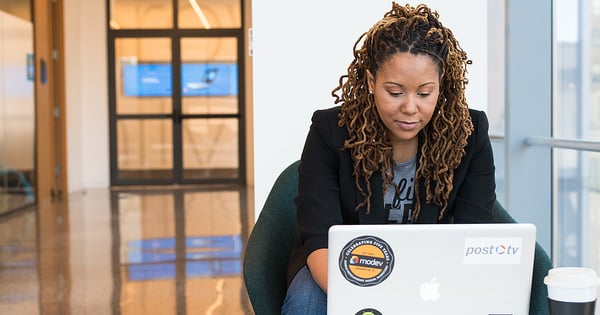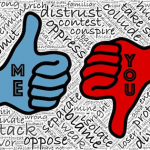
SAMAR KAUKAB, executive director of Arete at the University of Chicago (Muslim): There was a lot of talk about the recent Day Without a Woman being somewhat classist. So if a woman worked that day, is she a feminist, or no?
REBECCA BRATTEN WEISS, blogger at Suspended in her Jar (Catholic): I couldn’t take that day off work because I work from home, and I like my work at home, and I depend on my jobs for survival. And I am very dubious about whether the Day Without a Woman will lead to my getting a raise, or an advancement. It did seem to me to be a privilege thing, but I also read a piece talking about how we shouldn’t ignore the contributions that the marginalized or underprivileged have made in so many activist movements. What drove me crazy was the (predictable) reaction from the Right, things like “real women stay home and care for their families!” I loathe that whole “real women” nonsense. But here we have a more subtle question. Who’s a real feminist?
KERRY CONNELLY, blogger at Jerseygirl, Jesus (Progressive Christian): Yes, are there different ways to express feminism? And how would women who work at home, whether they are running their households or doing something else for income, express their solidarity with such an action? Who gets to decide, right? I always laugh when I hear those crazy things about real women stay at home. Often we are pointed to that Proverbs 31 woman — who definitely did not stay at home! She was all over the place! :- )
Rebecca: The idea that “women stay home” is so much a product of a narrow view of family, home, and culture, and has no connection with complex realities of how families have been structured across history. The woman of Proverbs is a fine example of how people talking about “Biblical womanhood” don’t seem to have paid much attention to what women in the Bible actually do! And similarly, setting up parameters for feminism based on what white middle-class American women find important ignores the realities of the work women do globally. Katha Pollitt recently wrote something about how it’s impossible to be a feminist and pro-life. One of her arguments was that reproductive rights are the most crucial element of women’s rights movements today. I thought – that means leaving out all the early feminists…or feminists in other cultures who have many, many serious obstacles they are facing, that may not be as prevalent here.
Kerry: Hmmm yes….and let’s face it….the earliest feminists are no less complicated a bunch than any other group of humans, and they had many failings. I think we spoke previously about the fact that while many of them were abolitionists, many others were motivated by the fact that Black men would have the vote when white women wouldn’t, and they actively kept women of color out of the movement. So they, in a way, decided that WOC could not be feminists, and unfortunately I think that divide is still very much felt today.
I hate that we have such limiting language such as pro-life and pro-choice around the issue of women’s health and reproductive rights. I am openly pro-life, not in that I support a ban on abortion but in that I support programs that will encourage and empower a woman to continue with an unplanned pregnancy. However, I am pro-choice in that I don’t want the government making such personal and intimate choices for myself and my family. And of course, that I get to sit here and speak hypothetically about it is completely an issue of privilege, since many women, as you point out, are dealing with much different and much more drastic situations than I.
Rebecca: Perhaps we are in danger of valorizing the concept of feminism itself, so that we have to draw lines and say “not a real feminist” whenever a problem arises. Instead of saying “feminist, but with problematic elements” – as the early feminists had problematic elements. That way, we could address questions that arise as issues within feminism, instead of saying “not a feminist! Shut up!” And, anyway, it seems un-feminist to deny women the right to be heard even when what they have to say seems to be on the side of sexism.
On that note, however, I do run into self-styled feminists in religious circles who may claim to be advocates of women’s rights, but who consistently attack and mock every single women’s movement that isn’t specifically their own. It’s one thing to say “I have issues with the Day without Women, but I can join them in solidarity on some issues.” It’s another to have a consistent stance of devaluing all other movements, and women who join in them. I think at that point, perhaps, you do not get to call yourself a feminist anymore.
Kerry: After I got back from the March in DC, a Christian woman came on to Facebook and, on one of my posts in which I shared pics of the March, she demanded (three times, no less!) that I “explain myself.” She said “no one knew what, exactly, we were marching for.” and again that I should “explain myself.” I pointed out that the purposes of the march were clearly listed on the site for those who actually wanted to understand, and not just pass judgment.
I think that story is an excellent reflection on society in general today, and especially when it comes to critics of feminism. They have an idea in their head and a formed opinion, but they don’t actually do the work of trying to understand who we are, and WHY we are.
Of course, the same can always be true of me, and I try to be self-aware of when I am passing judgment.
Rebecca: That’s why I keep irritating my fellow Trump opponents by saying, no, seriously, we DO need to listen to Trump voters and understand where they are coming from. This doesn’t mean I don’t think they made a terrible mistake, but I hate so much when people make sweeping judgments of me, without doing the research, I want to try to avoid doing that even to demographics that are driving me crazy.
It’s true what you say that people simply will not do the work of finding out what we’re about. Oh, and if you try to explain, gently and sweetly, what feminism actually is? They disappear. There’s a fairly well-known right-wing literary scholar who is always saying the most ridiculous, bone-headed things about feminists, and refuses to acknowledge any criticism. I keep thinking, imagine if I just made up some wild, deranged nonsense about his literary field, and refused to be educated on it? I would deserve to have my degrees revoked!
Of course, the mansplaining thing is hard at work in this case. And I want to NOT do this, so I think it’s important to let the margins of feminism remain porous, and allow for dialogue.
Kerry: I agree about leaving room for dialogue. Can we talk about the mansplaining thing? My husband says it’s sexist and I have heard some feminists say the same. The last thing I want to do is participate in sexist language — but how ca women talk about the experience that word entails if we don’t have word for it? It will never feel good to men until they start waking up to their own privilege. When they call foul on that word, is it their hurt privilege speaking, or do they have a point? Is the word mansplaining sexist?
Rebecca: I do think it can be used in a sexist way. Just because a man is explaining something to you, that doesn’t make it mansplaining. But we talked last time about the male privilege of naming, and I think that is so rooted in the tradition of civilization, built in and systemized over centuries, that men can fall into using that privilege to lord it over us. They have a choice not to, and I think if they are making the choice not to, this is admirable. But when they deny that it is a reality, it sounds like a denial that patriarchy and kyriarchy are realities. I mean, just because not all white people are privileged, doesn’t erase the reality of white privilege, either. But maybe we are too quick to call “mansplaining!” – and this maybe shuts down discussion?
I just realized what time it is! I need to go bring in firewood and prepare for the coming snowstorm!
Kerry: Yes! I have to go on the panic run to the grocery store for bread and milk myself, with the rest of humanity, before the apocalypse. Have a great day and stay safe tomorrow!
Rebecca: You too!
Image via wocintechchat.com | CC 2.0











